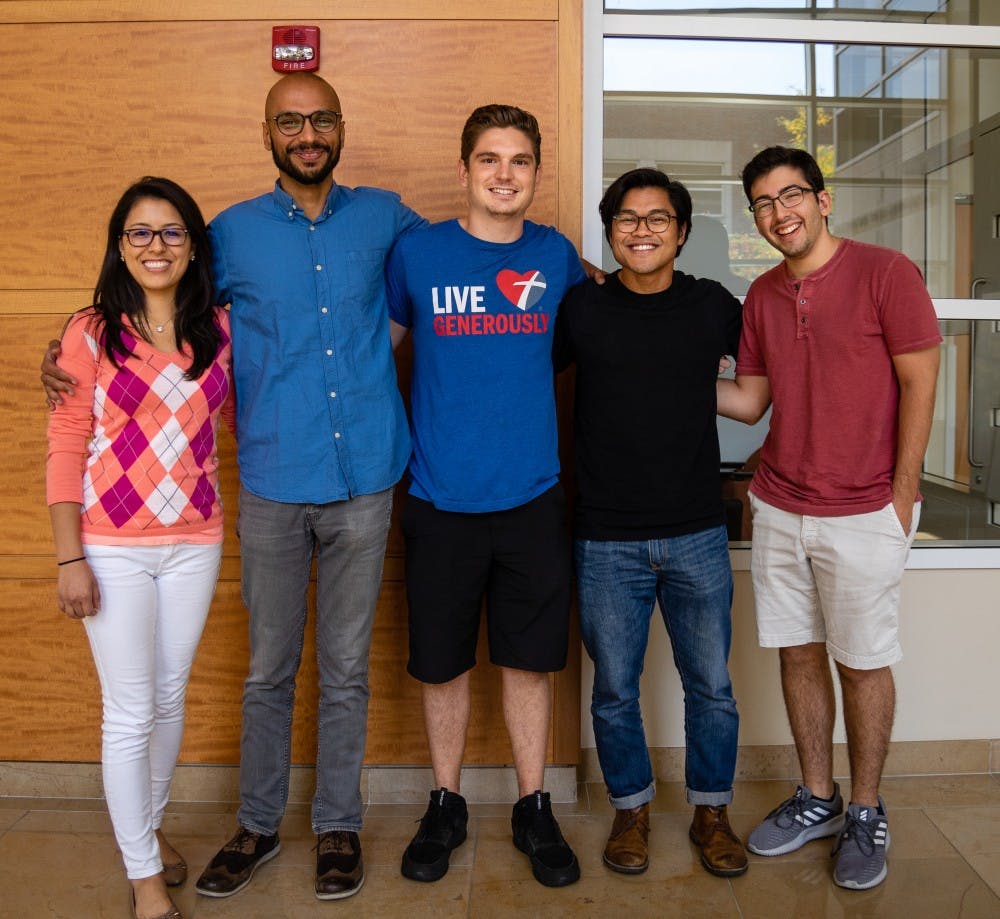Healthy Aging Initiative to be curriculum for every second-year medical student

(From left to right) Shing Chao, Kultaj Kaleka, Jonathon Skurya, Sean-Matthew Calo and Derek Wolfe pose for a photo on Sept. 4 in the Health Professions Building. The second-year medical students are coordinating the Health Aging Initiative, which is scheduled to start in mid-September.
From mid-September to mid-December, each Central Michigan University second-year medical student teamed up with a social work student, at least one College of Health Professions student and a faculty member to visit an elderly patient in the community who had signed up to be a part of the Healthy Aging Initiative.
This visit worked like an annual checkup where the students made sure the patients were aging at a healthy rate. The students checked for criteria like fall risk, risk of social isolation and oral hygiene.
During one particular checkup, a social work student recognized the patient had suicide ideation, said medical faculty Jyotsna Pandey.
Immediately after, the students contacted CMU faculty, and within the same day, the faculty got professionals to go and speak with the patient. Getting this individual help is all thanks to this initiative.
The Health Aging Initiative is a new part of curriculum this year for second-year medical students in CMU’s College of Medicine. The initiative has been seen as a success and, from here on, will be criteria every second-year medical student must accomplish.
California medical student Kultaj Kaleka said he thought the initiative was not only a wholesome experience and a chance to engage in interprofessional work, but it was crucial to take part in given the demographic makeup of the U.S. population.
According to Business Insider, people over the age of 60 will make up 25 to 29 percent of the population by the year 2050.
“In that regard, building a robust healthcare strategy and training people such as ourselves to take care of this oncoming paradigm, I mean, that’s what we are in it for, and I think that should be the call of the moment,” Kaleka said.
Kaleka said the initiative was particularly unique because the students were stepping into the patient’s home, which put the patient in power. Moreover, patients were receptive to the suggestions like balance workouts that the students made.
Trenton medical student Derek Wolfe, who had never worked with elderly patients before, felt like he was really able to connect with his patient by being in the patient's home. He said it was a more relaxed environment where he could banter with the patient.
“Yes, we had to complete all these items and assessments, but, you know, I learned some great tips along the way like Soaring Eagle has half-off buffet on Tuesdays,” Wolfe said.
Macomb medical student Jonathon Skurya found the work encouraging because he had only worked with elderly before in a medical setting where most of the patients were sick. Now, he was able to work with individuals who were in good health, and he could give them advice on how to stay in shape.
Skurya said this initiative also gave all medical students the opportunity to learn about the culture in this region of Michigan.
“A lot of the students in our class come from different places or even different states and cities, so one good thing is that we go into older individuals’ homes that are in our community and a future community we will be serving as physicians here,” Skurya said.
This experience aligns with the College of Medicine's goal of having students serve those in rural and underserved regions.
This initiative took a lot of planning, and, originally, not all second-year students were completely responsive, Kaleka said. Part of the hesitation was in regards to the extra work it included, and having to find a time that worked for the patient, faculty member and all students.
“It’s not easy to coordinate with other people. Once everything was scheduled, everything was, in my opinion, a very positive experience,” said Wolfe.
Despite initial hesitations, Skurya, Wolfe and Kaleka agreed they had heard positive feedback on the experience from the other students thus far.






